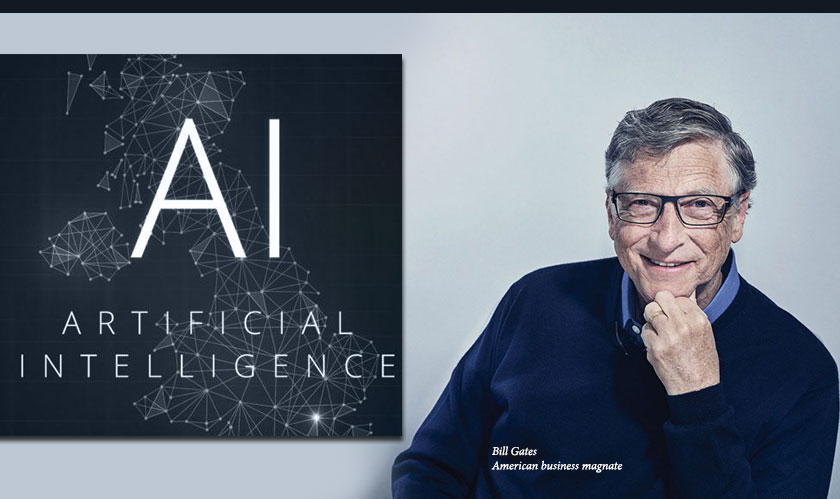Bill Gates, the co-founder of Microsoft, envisions that the future’s leading artificial intelligence (AI) company will have created a personal digital agent capable of performing various tasks for individuals. This technological advancement has the potential to significantly transform user behavior, eliminating the need to visit search engines, productivity websites, or even online retailers like Amazon.
During a recent event on artificial intelligence hosted by Goldman Sachs and SV Angel in San Francisco, Gates expressed his belief that the development of a personal AI assistant, which understands and adapts to a person’s needs and habits, will revolutionize the way people consume information. He stated that such an agent would assist individuals in processing vast amounts of content that they may not have had the time to read.
According to Gates, the chances of a startup or a tech giant emerging as the victor in the race to create this groundbreaking AI assistant are evenly split. While he expressed his hope that Microsoft would be at the forefront, Gates also acknowledged the impressive potential of startups like Inflection.AI, co-founded by former DeepMind executive Mustafa Suleyman.
However, Gates cautioned that it will take some time before this powerful digital agent becomes widely available for mainstream use. In the interim, companies are incorporating generative AI technologies, such as OpenAI’s ChatGPT, into their own products to enhance their capabilities.
In addition to discussing AI’s impact on personal assistants, Gates also highlighted its potential in accelerating innovations within the healthcare sector, particularly in the realm of drug development. Although scientists have yet to fully comprehend the intricacies of the human brain, Gates expressed optimism that humanity is approaching a stage where effective drugs for diseases like Alzheimer’s can be created. He even speculated that human trials for these new drugs could commence within the next decade.
Gates further emphasized that generative AI technologies capable of producing compelling text will be game-changers, particularly for white-collar workers. He noted that the rise of these technologies could potentially replace certain roles traditionally performed by humans. Moreover, Gates humorously remarked that future humanoid robots, which are expected to be more cost-effective for companies than human employees, should be designed with safeguards against Alzheimer’s disease.
In addition to discussing the potential impact of AI on personal assistants, Bill Gates also delved into the broader implications of AI technology across various sectors. He emphasized the significance of AI in driving advancements in fields such as transportation, energy, and agriculture. Gates believes that AI has the potential to revolutionize these industries by optimizing operations, increasing efficiency, and reducing costs.
Within the realm of transportation, AI-powered technologies can pave the way for autonomous vehicles, leading to safer roads and more efficient transportation systems. Furthermore, AI algorithms can help optimize traffic flow and reduce congestion, contributing to improved urban mobility and reduced carbon emissions.
In the energy sector, AI can be instrumental in enhancing the efficiency of renewable energy sources such as solar and wind power. By leveraging AI algorithms to optimize energy production, storage, and distribution, renewable energy can become more reliable and economically viable, accelerating the global transition to a sustainable energy future.
Moreover, AI holds great potential for revolutionizing the agricultural industry. By analyzing vast amounts of data, AI algorithms can provide valuable insights into crop management, disease detection, and soil health. This can lead to optimized farming practices, higher crop yields, and reduced environmental impact.
Gates also touched upon the ethical considerations surrounding AI development and deployment. He emphasized the importance of responsible AI practices, including transparency, fairness, and accountability. As AI systems become more powerful and autonomous, it becomes crucial to ensure that they are developed and utilized in a manner that aligns with ethical standards and respects individual privacy.
Additionally, Gates highlighted the importance of addressing the potential impact of AI on the workforce. While AI has the potential to automate certain tasks and replace certain jobs, Gates believes that it will also create new opportunities and job roles. He emphasized the need for individuals to acquire new skills and adapt to the changing job market to remain competitive in the AI-driven economy.
In conclusion, Bill Gates’ insights extend beyond the realm of personal digital agents, encompassing the broader implications of AI across various industries. From transportation to energy and agriculture, AI has the potential to drive transformative changes and improve efficiency. However, responsible AI practices, ethical considerations, and addressing the impact on the workforce are crucial factors that need to be carefully navigated as AI continues to evolve and shape our future.
Read More:





 Sony is Reportedly Making a Foldable Phone: Here is All You Need to Know
Sony is Reportedly Making a Foldable Phone: Here is All You Need to Know